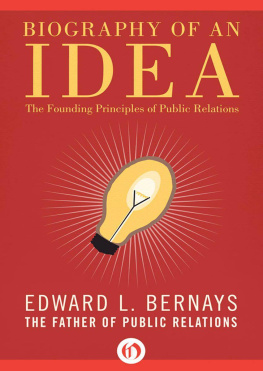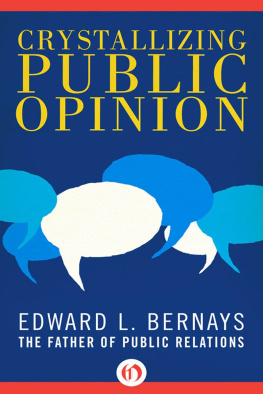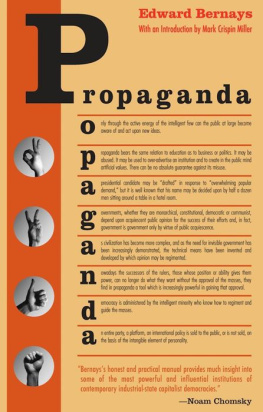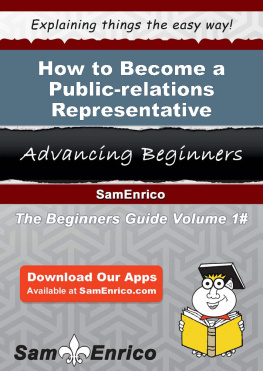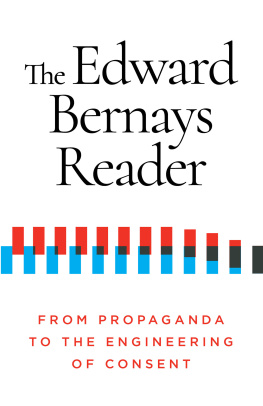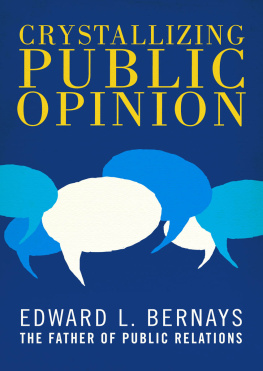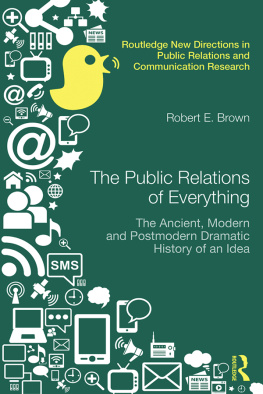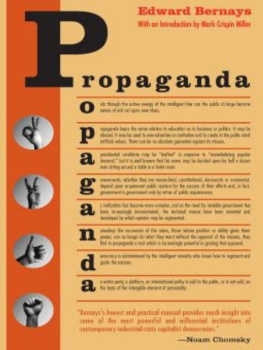Edward L. Bernays - Biography of an Idea: The Founding Principles of Public Relations
Here you can read online Edward L. Bernays - Biography of an Idea: The Founding Principles of Public Relations full text of the book (entire story) in english for free. Download pdf and epub, get meaning, cover and reviews about this ebook. year: 2015, publisher: Open Road Media, genre: Non-fiction. Description of the work, (preface) as well as reviews are available. Best literature library LitArk.com created for fans of good reading and offers a wide selection of genres:
Romance novel
Science fiction
Adventure
Detective
Science
History
Home and family
Prose
Art
Politics
Computer
Non-fiction
Religion
Business
Children
Humor
Choose a favorite category and find really read worthwhile books. Enjoy immersion in the world of imagination, feel the emotions of the characters or learn something new for yourself, make an fascinating discovery.
- Book:Biography of an Idea: The Founding Principles of Public Relations
- Author:
- Publisher:Open Road Media
- Genre:
- Year:2015
- Rating:3 / 5
- Favourites:Add to favourites
- Your mark:
- 60
- 1
- 2
- 3
- 4
- 5
Biography of an Idea: The Founding Principles of Public Relations: summary, description and annotation
We offer to read an annotation, description, summary or preface (depends on what the author of the book "Biography of an Idea: The Founding Principles of Public Relations" wrote himself). If you haven't found the necessary information about the book — write in the comments, we will try to find it.
Biography of an Idea: The Founding Principles of Public Relations — read online for free the complete book (whole text) full work
Below is the text of the book, divided by pages. System saving the place of the last page read, allows you to conveniently read the book "Biography of an Idea: The Founding Principles of Public Relations" online for free, without having to search again every time where you left off. Put a bookmark, and you can go to the page where you finished reading at any time.
Font size:
Interval:
Bookmark:

EARLY BIRD BOOKS
FRESH EBOOK DEALS, DELIVERED DAILY
BE THE FIRST TO KNOW ABOUT
FREE AND DISCOUNTED EBOOKS
NEW DEALS HATCH EVERY DAY!

Biography of an Idea
The Founding Principles of Public Relations
Edward L. Bernays

TO
D ORIS F LEISCHMAN B ERNAYS
MY TWENTY-FOUR-HOUR-A-DAY PARTNER
CONTENTS
That grounded maxim
So rife and celebrated in the mouths
Of wisest men; that to the public good
Private respects must yield.
Samson Agonistes,
J OHN M ILTON
PART ONE
beginnings
18911916
chapter 1
CHILDHOOD AT CENTURYS TURN
My first memory of home is of a modest house and a small back yard, with a square of green grass surrounded by a flagstone walk and, on three sides, a narrow grass border. Our house was one in a row of new brownstones that had sprung up among the scattered mansions and country estates on New Yorks East 139th Street. In 1895, living there was like living in a semirural suburb of New York City; there were no subways to pump people in and out.
I remember, too, a gray stone mansion, set in a pleasant garden nearby, where I attended kindergarten. Here, in my short blue-serge pants and jacket, broad red bow knotted over a white blouse and long black ribbed stockings and button shoes, I played with other genteel children. Our kindergarten teacher lined us up in order of size, the tallest first, and took her seat at an upright piano; then, at her signal, we marched around outside in the garden to the rhythm of the music. I was glad my height put me in second place, though I wished I were a little taller so that I could lead the procession. I tried to gain height by imitating the walk of the boy just ahead of me. Each time he stepped forward on his right foot, he raised himself nonchalantly on his toes; I did the same and felt the better for it. Under huge shade trees and rolling lawn, which were swept away much later by tenements and then by housing developments, we sat on tiny chairs in a large circle and clapped our hands to the music, wove mats and arranged small colored wooden balls as starlike mosaics in frames.
Playing with other boys and girls filled me with a warm glow of companionship, a sense of adjustment and belonging. Only three years before, in 1892, my parents had emigrated from Vienna to New York. My first birthday had been celebrated on the voyage. With characteristic foresight, my father had explored business opportunities in New York on a previous trip and had found a niche on New Yorks Produce Exchange. We lived in boardinghouses in Manhattan until Father was established as a grain exporter on the Exchange, when he bought the house on 139th Street and sent for my two older sisters, Lucy and Judith, who had remained in Vienna with my uncle, Sigmund Freud, and my grandparents, the Jakob Freuds. My two younger sisters, Hella and Martha, were born in New York.
My father had lived in Vienna for slightly over a decade. The Bernays family from Hamburg had been distinguished in Jewish culture, its roots in Spain. My great-grandfather Isaac Bernays, chief rabbi (Hakaam) of Hamburg in the early nineteenth century, introduced the Germany vernacular into religious services. He was related to Heinrich Heine, the poet. Two of his sons became well-known teachers, Michael and Jacob Bernaysthe former a professor of literature at the University of Munich. He embraced Christianity and became an adviser to the King of Bavaria, Ludwig. He wrote a profound book on Goethe. Jacob Bernays taught Latin and Greek at the University of Heidelberg. Isaac Bernays third son, Berman, a merchant, was my grandfather. He moved his family to Vienna in 1869 and became the secretary to the well-known economist Lorenz von Stein. When Berman died of heart failure on the street in 1879, my father Ely, aged 19, took his fathers place as the economists secretary. Here he remained several years. In Vienna my father met Anna Freud, fell in love with her and married her in 1883. Three years later his younger sister Martha married Annas brother Sigmund, a young physician just establishing himself.
Anna Freud, my mother, was one of six children of Jakob and Amalie Freud. My mother often spoke about her fathers broad liberalism and of his generosity. When fashion made one of its sudden switches, and Jakobs sons by his previous marriage lost their investment in an ostrich farm in South Africa, he voluntarily sold his factory to liquidate their debts, although he had no legal obligation to do so.
In 1892 he wrote a letter to two of my cousins which I understand was typical of his human approach:
M Y VERY DEAR LITTLE GIRLS ,
I was at Baden with your Aunt Anna [my mother] and she sends you a thousand greetings and kisses. Little Edward is the most charming boy and very kind. He awakens his wet nurse with song when he needs her. He was at the table for breakfast and participated busily in our breakfast. At lunch he came as our guest and ate cereal, eggs, and meat. He wants beer and wine and already sings pretty songs of his own composition. He kisses, laughs, eats, drinks, and speaks in a lively way, and weighs 19.2 pounds. Judith and Lucy have asked me to give him a pet name. I did, calling him Chap IV of Austria, because with Sigis three fellows, we now have four good-looking chaps in Austria. This nickname was unanimously accepted and I undertook the job of conveying the information to all the relatives. I am announcing it to the uncles in England, to you, and to Aunt Martha in Reichenau.
Your Grandfather,
J AKOB F REUD
I remember, as a young boy, the day a cable arrived from Vienna for my mother, bringing news of her fathers death. I had never before seen her cry. She wept and wept. I was not sad because I did not understand why she wept. I had never been at a funeral or visited a cemetery. But despite this, an age-old impulse impelled me, as a little boy, to bury my defunct goldfish and canaries under the back-yard sod in a cardboard shoebox and to mark their graves with half a clothespin. My childhood interest in burial is past; I regard burial as a primitive, unsanitary rite and have left instructions for my body to be used for scientific research.
My mother was close to me when I was a boy and she treated me with great tenderness. I first remember her in her early thirties. But to me she was ageless, an all-pervasive and beneficent influence. It is difficult for me to describe her looks. She was always there when I needed her or wanted her; she solved all my problems. Her looks mattered as little as her age.
She insisted that she looked like a Freudrather short, plump, with regular features and a button nose. She usually was tightly corseted and wore a neat white shirtwaist and a long black mohair skirt, the contemporary uniform of the middle-class matron. The dresses she wore at dinner were like armor plate, made for wear rather than for style or fashion. She was too busy caring for five young children and catering to a meticulous, moody husband to devote time to herself and her wardrobe. I do not recall ever seeing her in evening dress.
Her life revolved around the family. She did not participate in outside affairs, except intellectually. She read the Staats-Zeitung, a German-language daily, delivered each morning to the house, together with the New York
Next pageFont size:
Interval:
Bookmark:
Similar books «Biography of an Idea: The Founding Principles of Public Relations»
Look at similar books to Biography of an Idea: The Founding Principles of Public Relations. We have selected literature similar in name and meaning in the hope of providing readers with more options to find new, interesting, not yet read works.
Discussion, reviews of the book Biography of an Idea: The Founding Principles of Public Relations and just readers' own opinions. Leave your comments, write what you think about the work, its meaning or the main characters. Specify what exactly you liked and what you didn't like, and why you think so.

